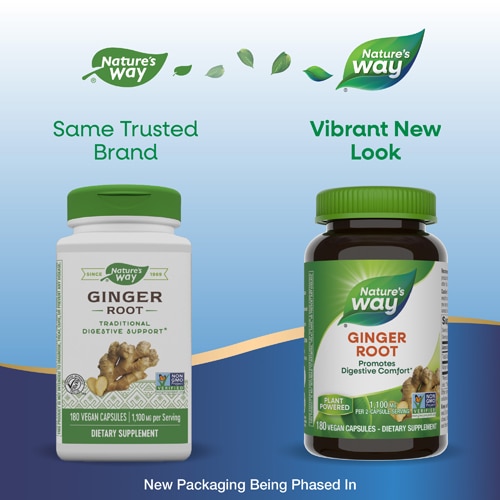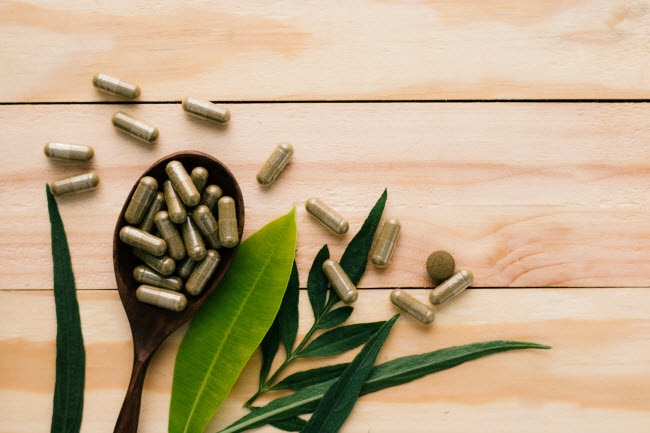The healing power of herbs has caught on like wildfire—so much so that 75% of Americans take an herbal supplement daily while the global market is expected to reach $86.7 billion by 2022.
But the ubiquity of the health trend doesn’t mean that herbal supplements should be taken with the mindlessness of an Altoid. Indeed, when you take herbal supplements, what you combine them with, what you need to steer clear of, and what you should seek out are all vital components of a successful regimen. Here’s what you need to know if you’re new to the world of botanicals.
What are herbal supplements? What should I look for?
While the type of herbal supplement(s) you elect should depend upon your health needs and your healthcare practitioner's recommendations, do make sure that the product you purchase has third-party validation from these sources: U.S. Pharmocopeia, ConsumerLab.com, and NSF International. These seals of approval “provide assurance that the product was properly manufactured, contains the ingredients listed on the label, and does not contain harmful levels of contaminants,” the NIH reports.
Also, look for herbs that are as close to their natural form as possible. This can result in a synergistic effect, which happens when more than one of the components of the plant are working together to benefit health.
What herbal supplements should I avoid?
Eschew products that include “proprietary blends” in their list of ingredients. Why? “Proprietary blends” fail to point out the exact amount of herbs contained. You, meanwhile, will want to know precisely what you’re buying and its dose. You also don’t want a product that’s filled with, well, filler.
Furthermore, avoid purchasing herbal products that come with exaggerated claims, such as “Lose 10 Pounds in Two Days,” “Grow Your Hair Three Inches in a Week,” and other quick “fixes.” Most of us know hype when we see it and when it sounds too good to be true, it usually is. As the Mayo Clinic points out, companies that make a specific medical claim—like “This herb reduces the frequency of urination due to an enlarged prostate”—are not complying with FDA regulations. Rather, look for products that are particular to your goals, and understand that they may hold the potential to naturally encourage them.
What steps can I take to ensure I actually take my herbal supplement?
It’s a common problem: You order a variety of herbal supplements from a quality retailer and make a concerted effort to take them…for the first three days. Then, life sweeps in and that bottle of Panax ginseng you bought has surpassed its expiration.
One of the wisest ways you can weave herbs into your life is by choosing preparations that suit your lifestyle. You may have a knack for remembering things in the morning, in which case a capsule form of the herbs you’ve decided on could easily be taken before you head off for the day. Or perhaps you’d prefer to treat yourself to a cup of herbal tea at night for that chamomile you crave, or to put red clover sprouts in your salad. Consider yourself a gal—or girl—on the go? Think of the versatility of gummy supplements—such as Garden of Life Elderberry Immune Gummies—which you can toss in your bag and consume when needed. In other words, take advantage of the forms available to guarantee a good fit.†
And when should I take them?
While the type of herb you’ve selected will determine the optimal time to take supplements, a good rule of thumb is this: Bitter herbs to enhance digestion should be taken 10-15 minutes before a meal. Other botanicals, however, should be taken between meals; as Dr. Sam Russo reports to Better Nutrition, “fiber in food can impair their absorption.” Also, drink plenty of fluids.†
Should I combine herbs?
Again, it all depends on the herb(s) you’ve selected. Curcumin, for example, pairs well with black pepper, as pipirine—the bioactive compound in black pepper—boosts curcumin’s absorption. (Used together and they might also improve digestion.) Ginger goes well with lemon balm and chamomile; echinacea with goldenseal and astragalus. But, once more, the combinations you take should depend on the recommendation of a professional, who should have a list of the other supplements and medications you take in hand. B vitamins, for example, should not be consumed with green tea extract, grape seed or other polyphenols, as they may decrease absorption.†
Which brings us to our next point: The importance of doing your research.
How should I research herbal supplements?
With discrimination. Blind searches on Google tend to arrive with bias, while government and university-run sites will provide objective information. A few to try include the American Medical Association, the National Institutes of Health and the National Academies of Sciences. If you are conducting research on a commercial site, confirm that its claims are backed by experts in the field, studies and peer-reviewed scientific journals. You can also contact the manufacturer for more information.
What else?
Just because an herbal supplement is natural doesn’t mean that it won’t have side effects or pose the possibility of an allergic reaction. As the Mayo Clinic reminds us, “all herbs—including herbal supplements labeled as ‘natural’—can have medicine-like effects. Anything strong enough to produce a positive effect, such as lowered cholesterol or improved mood, is also strong enough to carry risk.”†
What’s more, herbal supplements “generally haven’t been subjected to the same scientific scrutiny and aren’t as strictly regulated as medications.” To this end, certify that you enlist the counsel and approval of your primary care physician or naturopathic doctor before embarking on your botanical journey. This is your health, after all, and every action you take should be deeply considered.
†These statements have not been approved by the Food and Drug Administration. These products are not intended to diagnose, treat, cure or prevent disease.




